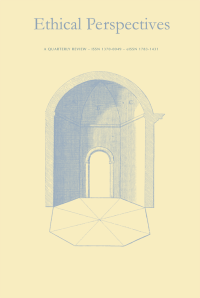Storytelling as Scientific Method
 The latest issue of Ethical Perspectives contains an extensive review I wrote on the book Levinas, Storytelling and Anti-Storytelling (2013) written by the British philosopher and novelist Will Buckingham. In his book Buckingham explores the style of the philosopher Emmanuel Levinas and his relation to storytelling (as well the way in which he tries to undo the telling of stories) in particular.
The latest issue of Ethical Perspectives contains an extensive review I wrote on the book Levinas, Storytelling and Anti-Storytelling (2013) written by the British philosopher and novelist Will Buckingham. In his book Buckingham explores the style of the philosopher Emmanuel Levinas and his relation to storytelling (as well the way in which he tries to undo the telling of stories) in particular.
Though Levinas’ work is used by a variety of literary scholars and fruitfully applied to the analysis of literary works, Levinas’ own relationship with narrative and storytelling is relatively under explored. Levinas, Storytelling and Anti-Storytelling wishes to fill this gap. But it also addresses broader questions on the role of narrativity within philosophy, questions on ‘what it might mean to write philosophically’ (2) and whether or not storytelling can be seen as a philosophical and even scientific method.
One of the most interesting propositions made in Levinas, Storytelling and Anti-Storytelling is the connection between narrativity and ethics. Buckingham links storytelling directly to ethics, even suggesting that storytelling is ethical in itself, because the storyteller pays attention to particularities and historicity. This is in opposition to the practice of the philosopher-scientist who seeks ‘an essence that is fixed and absolute and eternal, a truth that is independent of time and circumstances’. (20) Hence, one of the issues that Buckinghams book raises and that intrigues me the most (also in the light of my own research into the relation between the public and academic discourse on literature): is it possible to make the opposition between the artist-storyteller and the philosopher-scientist into a useful dialectic? And if so, how?
Read the entire review in Ethical Perspectives 21 (2014) 2, p.302-307.
On Ethical Perspectives:
Ethical Perspectives aims to stimulate in-depth reflection and dialogue among researchers and decision-makers in all areas of human endeavour who are conscious of deep-seated ethical questions in areas such as contemporary economics, sociology, medicine and health care, politics, law, business, labour relations, cultural life, and other perennial and emerging questions.
Striving after interdisciplinary collaboration among ethicists and specialists from diverse sciences, Ethical Perspectives is primarily an international forum for the promotion of dialogue between fundamental and applied ethics.